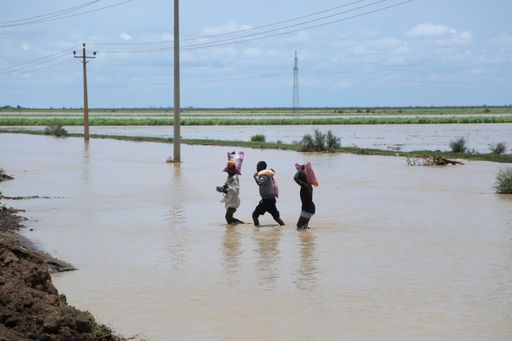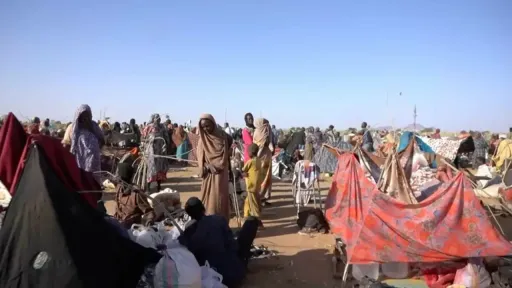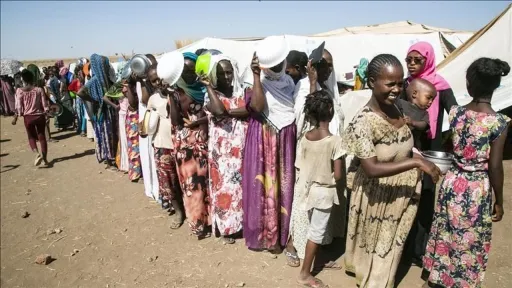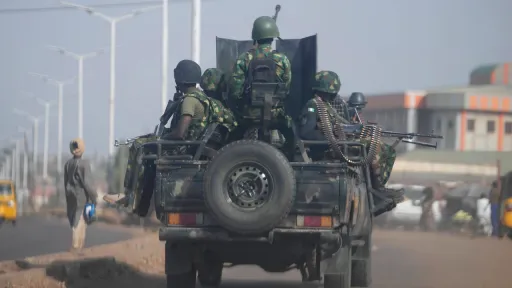Adhieu Marial stands in what remains of her home in South Sudan's Unity State, surveying what the floodwaters spared.
"First, we ran from the guns. Now, we are running from the water," the mother of four tells TRT Afrika.
In recent weeks, overflowing rivers have swallowed vast swathes of the Jonglei, Upper Nile and Unity states, displacing over 100,000 people. Many had only just begun to tentatively rebuild their lives after being forced to flee violence that erupted earlier this year.
Now, floods are testing their resolve once more.
Adhieu, among those battling to stay afloat in the face of yet another calamity, has made up her mind to focus on the future. Past adversities have taught her the only thing that works when you have nothing more to lose is resilience.
"Floodwaters engulfed our home, but we continue to hope. With these plastic sheets distributed by aid agencies, at least we have a tiny shelter. My children are safe for now. We are planting our feet on this small piece of dry ground, and we will start again. We have to," says Adhieu, echoing the feelings of thousands struggling to rebuild their lives from scratch.
Compounding crises
Every day, hope is put to the test in flood-ravaged states of South Sudan as those who lost their homes and livelihood seek ways to make a fresh start.
The UN Refugee Agency (UNHCR) warns that if the flooding continues, up to 400,000 people could be displaced by the end of the year. The peak is expected towards the final weeks of October, threatening to exacerbate food shortages.
"We are witnessing a perfect storm of climate shocks and conflict, where one crisis relentlessly compounds the other," Eunice Njeri, a field coordinator working with various non-governmental organisations in South Sudan, tells TRT Afrika.
"A family displaced by fighting arrives in a new area, only to be immediately displaced again by floods. This constant movement shatters community support networks, overwhelms basic services, and creates a vicious cycle of vulnerability that is incredibly difficult to break."
The solution, Njeri points out, lies in merging strategies to mitigate each cycle of pain instead of treating them as different problems. "The international response must be as interconnected as the crises," she says.

Education as bedrock
Amid the challenges, a heartening aspect of the flood-affected population's fightback is their unshaken faith in the power of education.
Teachers are determined to keep education going even as schools and classrooms turn into stagnant pools.
"This is our greatest challenge," says Puot Kuol, a teacher in Upper Nile. "But we can't surrender. The war disrupted their education, and now flooding poses another challenge. But we are looking for solutions – teaching under the shade of a tree, inside a donated tent, anywhere we can. These children are South Sudan's future. We will find a way to teach them."
Puot's sentiments illustrate how local communities in South Sudan are determined to rebuild, relearn and reclaim their future against all odds.
Critical funding gaps
Aid agencies are reinforcing this resilience, with the UNHCR and its partners prioritising lifesaving assistance in the form of cash handouts, emergency shelters and plastic sheeting.
They are also working on long-term adaptation like deploying water pumps and rehabilitating dykes. These efforts build on five years of work to help communities withstand recurring climate shocks.
Yet the international appeal for South Sudan remains critically underfunded, contrasting with the scale of a crisis that demands more.
Current levels of funding only allow UNHCR to assist a third of the people likely to be displaced this year, forcing the agency to scale down critical operations in affected regions like Unity State.
But for those on the frontlines, every piece of plastic sheeting, every repaired dyke and every makeshift classroom is a victory against the tide.

























